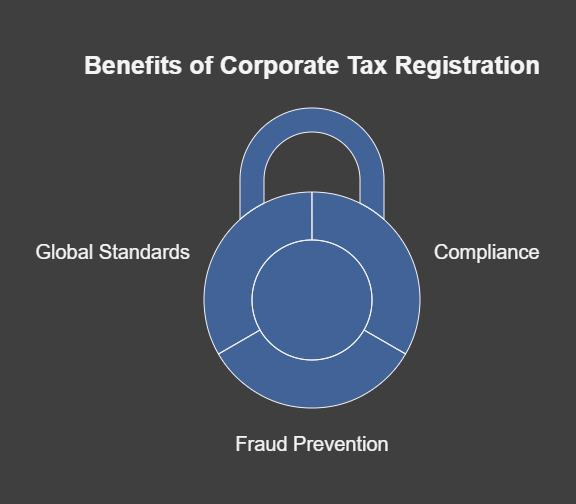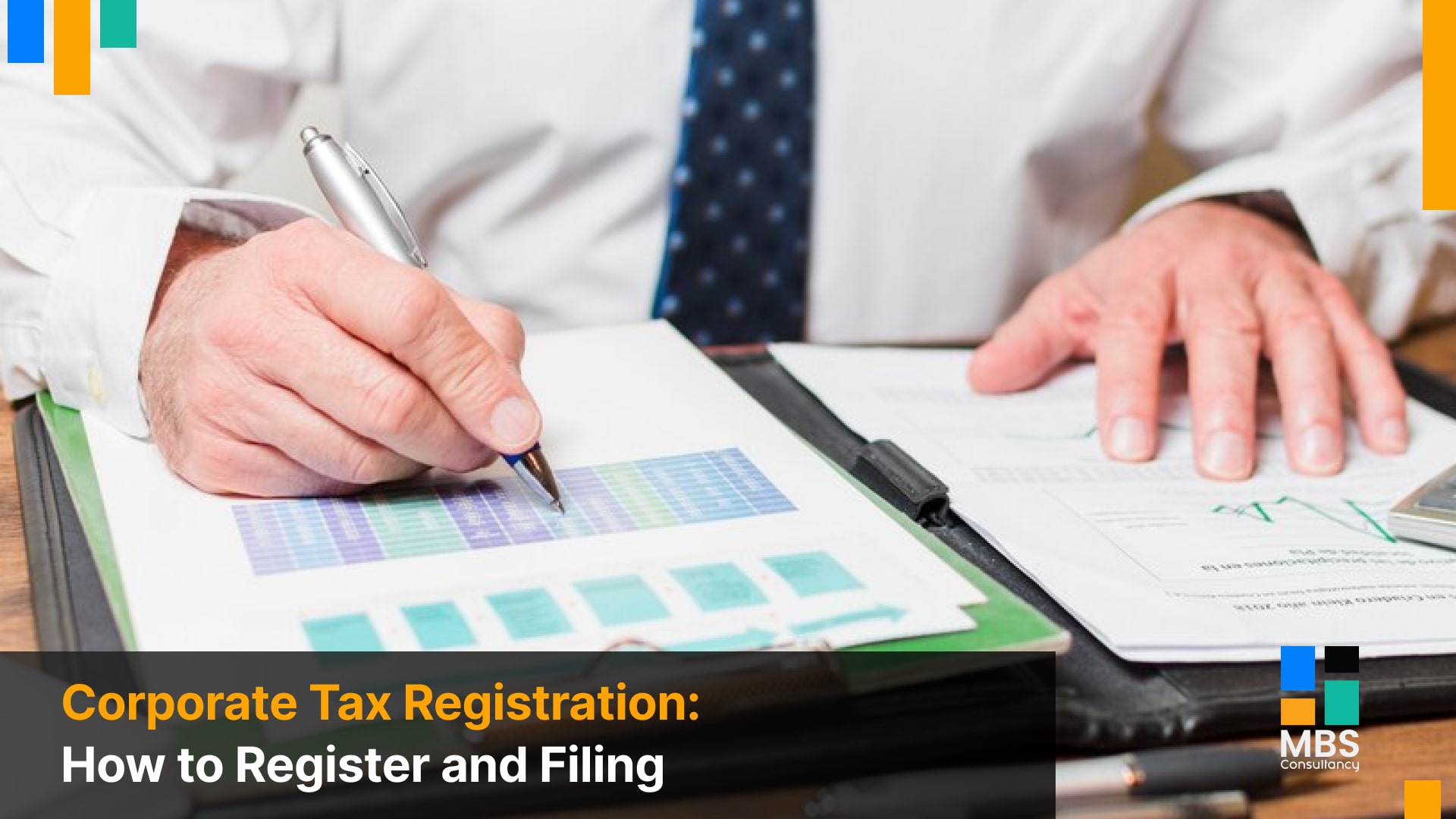The UAE continues to strengthen its economic framework. Here, corporate tax registration has become an essential requirement for businesses operating in the country. The introduction of corporate tax for businesses marks a significant step towards diversifying government revenue sources. It has started to align it with global tax standards.
Understanding the process of corporate tax registration UAE and filing is crucial for compliance if you’re running a business in the UAE. It ensures smooth operations
In this guide, we will walk you through:
- How to register for corporate tax?
- Why register for corporate tax?
- Get MBS Consultancy Services for corporate tax
So, whether you’re a new startup or an established company, stay ahead of your tax obligations. It will help you avoid penalties. But, also enable your business to thrive in a competitive market.
Why it is Essential to Register for Corporate Tax in UAE
According to the Federal Tax Authority, every taxable person, including a Free Zone one, is required to register for corporate tax and get a registration number. The FTA also requested that even the exempted ones should register for Corporate Tax.
Similarly, understanding the Corporate Tax registration process in the UAE is crucial for all businesses. While knowing the registration requirements and timelines. Having this knowledge helps entities ensure compliance with the new tax laws. As a result, it helps them avoid potential penalties and complications.
Mandatory Corporate Tax Registration in the UAE
With the introduction of the corporate tax regime, mandatory corporate tax registration in the UAE has become a non-negotiable requirement for all taxable entities. Whether you’re operating as an LLC, a Free Zone company, or even a foreign branch, registering for corporate tax is legally required. Not complying can lead to significant fines and delays in filing obligations.
Corporate Tax Registration Dubai: What You Should Know
If your business is based in Dubai, the process of corporate tax registration in Dubai follows the same federal guidelines issued by the FTA. However, many companies prefer to work with local consultants who understand the emirate-specific trade license nuances and can streamline registration.
Dubai-based firms, particularly those operating across multiple sectors, are encouraged to complete their registration well ahead of deadlines.
Corporate Tax Registration Guide for New Businesses
New to taxation in the UAE? Here’s a quick corporate tax registration guide to help you stay on track:
- Register early via the EmaraTax platform
- Monitor updates from the Federal Tax Authority
- Keep all trade licenses and ownership documentation ready
- Consult with tax advisors to avoid rookie mistakes
The guide also recommends conducting a compliance health check to prepare for eventual tax audits and filings.
How to Register for Corporate Tax UAE?
The FTA has introduced pre-registration of corporate tax in the EmaraTax platform. It is an online portal for taxpayers to handle all the:
- Tax registrations
- Returns
- Refunds
- Deregistration and
- Payment in one platform
Now, we share the process to register for Corporate Tax on EmaraTax
—> Firstly, login or sign up for an account
—> Add a Taxable Person if needed
—> Select ‘Register’ in the Corporate Tax Section
—> Follow the guidelines
—> Fill in entity details, add business activities, owners (if applicable), and branch details
—> Enter contact information and authorized signatory details
—> Review all information, and declare its accuracy
—> Submit your application, that’s all!
Need for Corporate Tax Registration in UAE
The UAE Governance and the Ministry of Finance have come up with a tax structure and laws. They launch it to benefit the companies that pay corporate tax. Businesses subjected to corporate tax can have the following advantages:

- Staying compliant with the tax law and following up on changes
- Identifying malicious tax practices
- Following world-class tax standards
Individuals/Businesses Exempt from UAE Corporate Tax
The FTA requested that the exempted persons should register for Corporate Tax. For instance, the exempted business has to pay 0% of corporate tax. Some of the categories are exempted from Corporate Tax
In this list, the number one person is a salaried person. The employee’s salary will not be affected by Corporate Tax. But if the individual earns from freelancing activities, then they will be charged with the company tax.
Secondly, the shares or similar assets that resulted in dividends, capital gain, or any income earned by personal potential. They are also exempted from corporate tax
Investment in real estate is legal in the UAE until the investor has no business license.
Further, the potential intra-group transactions or reorganizations will not be affected by the Corporate Tax. Lastly, corporate Tax will not be charged on the foreign investor’s income. The income generated from dividends, gains, royalties, and similar investment returns unless obtained through business or business activity
Individuals/Businesses register for Corporate Tax
Every person needs to register for corporate tax and get a registration number if he’s entitled to pay corporate tax. In other words, if your business is taxable under the Corporate Tax policy, you should apply for Corporate Tax registration in the UAE. On registering, obtain a Tax Registration Number within a specific period.
What is the Timeline for Corporate Tax Registration
The Corporate Tax registration process continues into 2026. A business with an initial tax period starting from June 2026 should register for Corporate Tax within 26 months – by January 2026. Their respective Corporate Tax return filing date would be February 2028.
After registration, businesses in the UAE will have up to nine months from the end of the relevant tax period to file their Corporate Tax returns with the FTA and pay the Corporate Tax.
Don’t Miss the Corporate Tax Registration Deadline UAE
The corporate tax registration deadline in the UAE varies based on your business’s license issue date. However, as a general rule, companies with tax periods starting in 2023 had until 31 May 2024 to register.
Missing the deadline can trigger administrative penalties and hinder your ability to file corporate tax returns on time.
What Happens If You Don’t Register? Corporate Tax Fines Explained
Failure to register can result in substantial corporate tax fines, including penalties for late submission, inaccurate information, or failure to maintain proper records. These fines can accumulate quickly and disrupt business continuity. That’s why timely registration and accurate filing are critical from day one.
The Role of Tax Audits in the Corporate Tax System
Every business subject to corporate tax must be prepared for a tax audit by the Federal Tax Authority. A tax audit typically reviews financial records, deductions, and declarations to ensure compliance with UAE corporate tax law. Preparing ahead by maintaining proper documentation and aligning with FTA regulations can save you from a lot of trouble later.
Corporate Tax Optimization Strategies
Businesses are now exploring corporate tax optimization strategies to minimize liability while staying compliant. This could involve restructuring, income shifting, or capital allowance planning. These strategies not only reduce the effective tax rate but also ensure long-term fiscal sustainability.
A strong tax optimization plan begins with timely registration and thorough understanding of deductible and non-deductible expenses.
Corporate Tax Registration Service with MBS Consultancy
MBS Consultancy is a reliable name when it comes to hiring tax consultants. We have the most extensive expertise in Corporate Tax registration. Our team involves tax advisors who provide quality services in the registration process for Corporate Tax from start to end. We are aware of the major changes resulting from the corporate tax implementation.
It is advisable to hire experts like MBS consultancy, as the early preparation of corporate tax compliance saves a lot of costs and minimizes stress. Our vast experience assures you a smooth process. Plus, MBS consultancy assists you with updates on corporate tax registration and filing CT returns. Stay compliant with the regulations and save from fines and penalties by hiring us!
FAQ
-
How much is corporate tax in the UAE?
Taxable profits that fall under AED 375,000 shall be subject to a zero rate annually. On the other hand, taxable profits above AED 375,000 shall be subject to a 9% rate annually
-
Is there a corporate tax registration deadline in the UAE?
The deadline for submitting an application generally depends on the date of the corporate entity’s license issuance. However, the first registrations are required to be submitted by 31 May 2024. Note that, different deadlines will apply for entities incorporated after 1 March 2024. Don’t forget to meet the deadline to stay out of trouble!
-
How can I register my company in the UAE?
Submit an application to the DED in the emirate where you intend to locate your business. Plus, leverage digital systems that let you register a business online. There you get a commercial license, just need to submit the required paperwork and have a license in a matter of minutes.
-
How to register for corporate tax in UAE?
The process to register for Corporate Tax is simple on EmaraTax:
- Log in or sign up for an account
- Add a Taxable Person if needed
- select ‘Register’ in the Corporate Tax Section
- Follow the guidelines
- Fill in entity details
- Enter contact information and
- Authorized signatory details
- Review all information and submit your application.
-
What are deductible expenses in the UAE?
Mostly, normal business costs in the UAE are tax-deductible. These may include:
- Illegal payments like bribes and fines
- Taxes you already pay like corporate tax and
- Unrecoverable VAT, and
- Money leaving the company like dividends and foreign taxes
Even entertainment gets special treatment. Only half the cost is deductible. For specifics on your business, consult a tax advisor.




